|
Saturdee Opry
Links # 133: Beauty, Gioacomini
Saturdee Opry Links' All Beauty All The Time Edition is now posted for your
eddiefication. You will also find a tribute to the late, under-appreciated tenor
Giuseppe Giacomini, who died July 28, 2021, and various other beautiful items
sure to dazzle, please, and probably bore you. Salud.
https://www.youtube.com/watch?v=6nvclk4p6Wo
Saturdee Opry Links Overture!
"Luisa Miller," by Verdi. Toscanini and the NBC Symphony.
https://www.youtube.com/watch?v=qILfMocBbrI
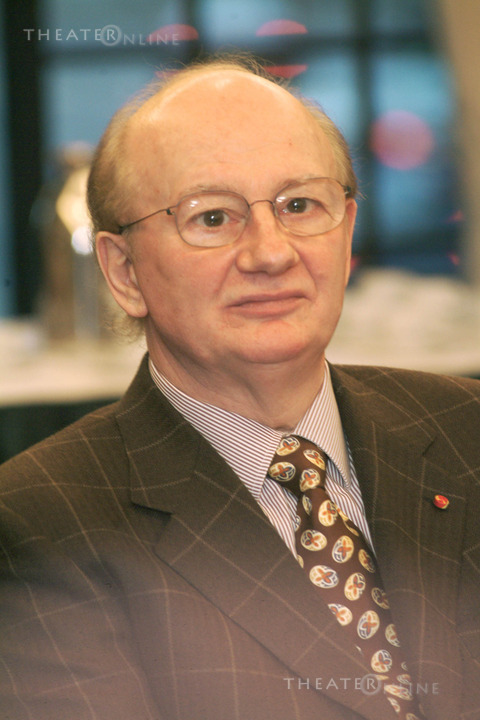 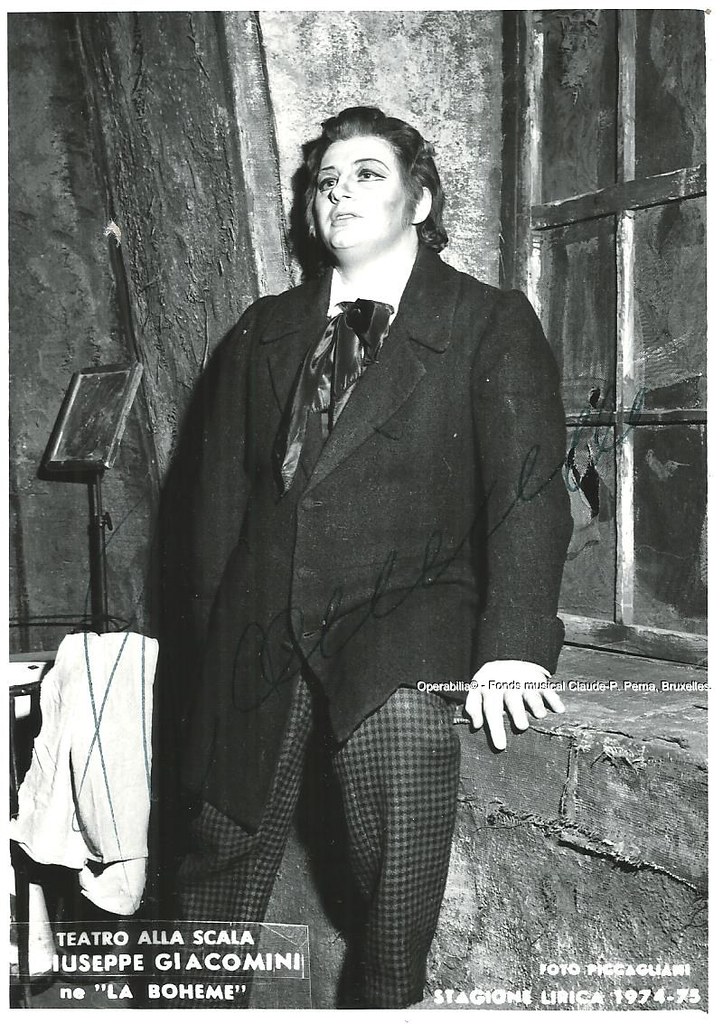
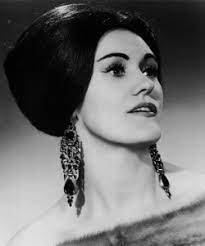

The late tenor Giuseppe Giacomoni, who passed away
at 80 July 28, 2021.
Young Joan Sutherland
Old Leontyne Price
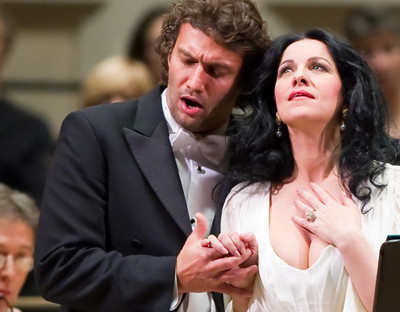
Jonas Kaufmann and Angela Gheorghiu
1.
Comprehensive obits have yet to appear. Even his Wikipedia entry is scant. Why?
Giuseppe Giacomini, who died a few days ago at 80, had one of the walloping,
outsized tenor voices of the latter half of the 20th century. A frequent guest
at the Met and many major houses, his singing is revered by many who witnessed
it. In terms of sheer talent and ability to thrill and move, he was---many
aficianados say---worthy of the company of Domingo, Carreras, Pavarotti. And yet
he never attained stardom, really, never became a household operatic word. Why?
My theory: discrimination. Giacomini, you see, was not handsome. To put it more
bluntly, he was rather homely---looked more like a bookkeeper than a Rodolfo or
Cavaradossi. Yes, I think it was somewhat a matter of looks, I really do. Here
he is at age 54 (!) with a ripping (pardon the expression) reading of the
chestnut, "Celeste Aida," live on stage in Egypt in 1994. Remember, this aria,
which requires a powerful and sustained legato capped off with a couple of
roof-rattlers, is sung almost first thing in the opera. The tenor has no chance
to warm up, get comfortable in the role.
https://www.youtube.com/watch?v=UxkRlzjvKm8
Setting: A hall in the Palace of the Kings at Memphis.
Synopsis: Rumors of an impending war with Ethiopia have been circulating.
Radamès has just been told by Ramfis that Isis has named a new, young man to
command the Egyptian Army. Radamès wishes it were he so he could free Aida.
http://www.aria-database.com/search.php?individualAria=7
2.
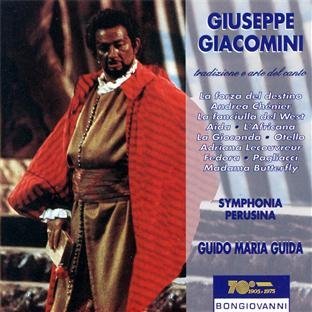
Giacomini in Verdi's "Otello."
On the other hand, while Giacomini reportedly thrilled houses wherever he
sang---one blog noting his passing referred to his "visceral" impact---he didn't
seem to quite have the, call it freedom, the effortless ascension, of the
greatest tenor voices. The late Giuseppe sounds as if he has to work a little
harder at the proceedings, even if the results are excellent. Here is an
illustration of what I am talking about, or trying to. This is the world's
greatest short aria, or the world's shortest great aria, as I like to say here
ad nauseam---sung by Giacomini, and then Mario del Monaco (with whom he
studied), and Enrico Caruso. Never mind if you think you have no expertise in
judging operatic singing (I don't, either)---just listen and see which you
prefer. (Note: there is an interesting anatomical description in the notes
following the video that might or might not explain Giacomini's limitations.) ¿Quién
es más macho?
https://www.youtube.com/watch?v=J8wtC8waLu8
Setting: a party at Fedora's house, Paris, France, late 19th century
Synopsis: Fedora has found out that Count Loris killed her fiance and swears to
avenge his death. As the first step in her plan to capture Loris, she goes to
Paris and attempts to get him to fall in love with her. Later, they are at a
party at Fedora's house and he tells her that he truly loves her.
Translation:
http://www.aria-database.com/search.php?individualAria=1123
SOL GIACOMINI EXTRA!
"Publicity-shy and self-effacing, Giacomini’s unassuming appearance belied a
voice of quite astonishing power and charisma, with a near-baritonal weight and
colour in the middle and lower reaches and a ringing, open upper register that
scythed easily through the thickest orchestration whilst retaining its intrinsic
beauty. (All of these qualities can be heard to hair-raising effect on the video
below, in which he partners a visibly awestruck Sherrill Milnes in a
concert-performance of the great duet ‘Sì, pel ciel’ from Otello).It was perhaps
Giacomini’s lack of superficial star-power that led to his relative neglect by
record-companies in an era which saw his contemporaries Plácido Domingo, Luciano
Pavarotti and José Carreras elevated to household-name status." ----Katherine
Cooper, Presto Music.
Giacomini and Jessye Norman, Dmitri Hvorostovsky, recording "Cavalleria
Rusticana," by Leoncavallo.
https://www.youtube.com/watch?v=UEns6o1o9QQ&t=570s
TRIBUTES:
https://www.prestomusic.com/classical/articles/4142--obituary-giuseppe-giacomini-1940-2021
https://operawire.com/obituary-tenor-giuseppe-giacomini-dies-at-80/
https://myscena.org/adrian-rodriguez/italian-dramatic-tenor-giuseppe-giacomini-dies-at-80/
The poor fellow never received a formal obituary in major media!
3.
No matter his limitations, whatever they might have been, the late tenor
Giuseppe Giacomini gave his life over to his art. For this, he should be loved,
and inspire gratitude. After his opera career, he sang recitals (into his 70's),
and it is perhaps in this milieu that we can witness the man at his best. (It's
hard to knock out a great aria or two in the course of performing a three or
four-hour opera, folks.) Here is something quite astonishing that must have been
"right up his alley." If this does not attest to his vocal prowess, nothing
does. This is "Ch'ella mi Creda," the aria Puccini added to his opera, "The Girl
of the Golden West," reportedly at the demand of Enrico Caruso, who premiered
the work. (Why? The entire opera is a departure from Puccini's duly legendary
lyricism, more of an abstract essay, and Caruso demanded, in essence, a good,
moving, stirring melody. Puccini reluctantly acceded.) The aria was incredibly
popular in its time, sung as a moral booster by WWI troops. Giacomini is shown
here in 1994 at age 54.
https://www.youtube.com/watch?v=1M1NDY5s0cg
Setting: a forest at the foot of Cloudy Mountain, USA, 1849-50
Synopsis: Johnson is about to executed for his crimes committed as Ramerrez. He
explains his final wish passionately : that Minnie think that he was freed and
never know his actual fate.
Translation:
http://www.aria-database.com/search.php?individualAria=717
SOL EXTRA!
So you think Puccini was a master of moving melodies, eh?
https://www.cowboysindians.com/2018/10/puccinis-western-opera/
4.
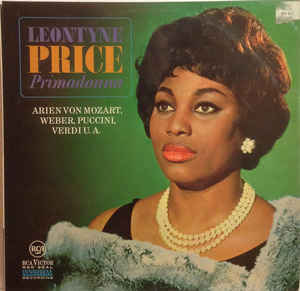
In today's All Beauty All the Time edition of SOL, we turn to someone not
primarily known for the lyrical elasticism required of Mozart. Or is that
elastic lyricism? But this is is so lovely, so what, eh? This is Leontyne
Price---still with us at 94!---with "L''amero saro costante" from Mozart's "Il
Re pastore." Written when Mozart was just 19, the opera was commissioned by the
Archbishop-Prince of Salzburg, and is nothing if not bubbling over with melody.
Here's one now! Just a little palate cleanse, or, as Jerry Garcia once said of
listening to Charlie Parker records, "a drink of water." (Please try to
disregard the schmaltzy added-on fiddling of Itzhak Perlman, argh, yech.)
https://www.youtube.com/watch?v=4Wywg9jxdnI
Synopsis : Torn between attachment and power, the young heir to a fallen throne
chooses love and renounces all authority. However, his self-denial and fidelity
will make him worthy to reign and to wed his beloved. . .Amintas, a shepherd, is
not convinced that he is not really meant to be king. He is, though, convinced
that if he is king, he only wants one Elisa for his wife. He sings this to
Agenor, saying that he will be her faithful lover and husband and only in her
will he find joy, peace, and happiness. Agenor mistakenly thinks that he singing
about Tamyris though, and is heartbroken.
Translation:
Italian---
L'amero, saro costante:
fido sposo, e fido amante
sol per lei sospirero,
In si caro e dolce oggetto
la mia gioia, il mio diletto,
la mia pace io trovero.
English:
I will be constant:
trustworthy spouse, and trustworthy lover
only for her I will sigh,
In dear and sweet visage
my joy, my beloved,
I will find my peace.
5.
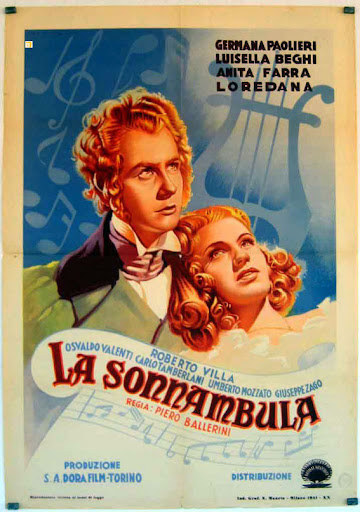
Now, I've looked up the definition of "portamento," and while I intellectually
grasp it, I can't say that would know good portamento from bad. It's essentially
a "slide" from one note to the next, and apparently, there are techniques and
rules for such things. I also happen to know---as we all probably do---what a
"scoop" is, though, Sinatra aside, I can't tell you what constitutes a good
scoop and a bad one. (You know, it's when you don't hit the note spot-on, but
start a little below and "scoop" upward to the right point.) All of which is to
say, you don't have to know any of this stuff in order to enjoy beautiful
singing. Those of you who follow SOL, and I know there are at least two or
three, know that I prefer romantic opera, and verismo, and have less affection
for (and understanding of) earlier bel canto fare, which is largely concerned
with (as the name suggests) beautiful singing, not emotional content. Still, I
present bel canto stuff here, from time to time, for those who enjoy it. Even if
you are not among them, you must appreciate birds singing in the sun, right?
This is not much different. Here is an exemplar of bel canto mostly without
peer, Dame Joan Sutherland, who with lantern jaw, big-boned 5' 9" physique, does
not suggest the incredibly ornate, delicate singing in this selection,
"Sovra il sen la man mi posa," from Bellini's "La Sonnambula." This is
technically a cabaletta, which is, Google informs, "an operatic aria with a
simple, animated rhythm." All of which is a lot of throat-clearing to justify
this incredibly beautiful example of operatic singing, take it or leave it.
(THANK YOU, BONNIE TONE.)
Setting: The village green of a village in Switzerland, early 19th century
Synopsis: On her wedding day, Amina sings that she is so filled with joy that
she cannot find the words to tell how happy she is.
https://www.youtube.com/watch?v=34ZBED4z7JI
Translation:
Sovra il sen la man mi posa,
Palpitar, balzar lo senti:
Egli Š il cor che i suoi contenti
Non ha forza a sostener.
English:
Place your hand
here upon my breast
and feel how wildly it throbs:
that is my heart,
which cannot contain
the happiness it feels.
6.
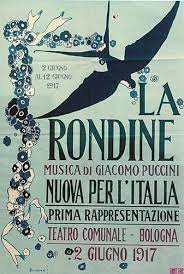
When in doubt, "La Rondine." Puccini's quasi-operetta, in my arrogant opinion,
contains his most affecting melodies. Too bad the opera doesn't really generate
the sympathy for the characters to give the poignancy of the music more oomph.
When in doubt for a soprano, Monserrat Caballe. Her unforced exactitude,
control, nuance are always winning, always a revelation. Here is the redoubtable
aria, "Chi il bel sogno di Doretta," or "Doretta's Beautiful Dream."
Synopsis: Act 1. Magda's salon, Paris. At a cocktail party hosted by the
courtesan Magda, the poet Prunier expounds his theories on love. Magda's friends
Yvette, Bianca and Suzy playfully mock him, while Lisette, Magda's maid, tells
him he does not know what he is talking about. Prunier takes offense and Magda
orders Lisette to leave. Prunier maintains that no one is immune to romantic
love and sings the first verse of his latest song about Doretta, who rejected a
king as her suitor because of the value she placed on true love. He does not
know how to finish the song, so Magda takes over and provides the second verse:
she recounts how Doretta falls in love with a student (Aria: Chi il bel sogno di
Doretta). Magda's guests are charmed by her performance and her long-term
protector Rambaldo gives her a pearl necklace.
https://www.youtube.com/watch?v=VJlfwQ3mKNw
And, if you would like to see how it can look on stage, here is Angela Gheorghiu
(who is substantially responsible for having revived this opera early this
century.)
https://www.youtube.com/watch?v=IzFcK61lOjI
Translation:
https://lyricstranslate.com/en/chi-il-bel-sogno-di-doretta-dorettas-beautiful-dream.html
7.
Angela Gheorghiu was famously---or infamously---married to tenor Roberto Alagna.
They sang together in many productions early in the century, quite the box
office sensation. But the relationship was as tempestuous as something out of. .
.opera. They fought, they cancelled performances, they broke up, they reunited,
they finally. . .broke up. The whole rollicking partnership lasted about ten
years. One of the alleged sticking points was, Gheorghiu has said in interviews.
that Alagna became insanely jealous every time she sang with Jonas Kaufmann.
(Don't ever say that SOL does not indulge in cheap gossip.) The chemistry
between Kaufmann and Gheorghiu was potent, wonderful, and seems entirely based
in music, not the. . .other stuff. I prefer their pairing over anything she did
with Alagna, but then, my opinion about anything has every bit as much
importance as a baloney sandwich. Still, here are two wonderful examples of the
Kaufmann/Gheorghiu partnership. First, they rehearse recording a couple of
minutes from the act one love duet from Puccini's "Madame Butterfly," and
second, the finished recording of the entire duet. "Vogliatemi bene, un bene
piccolino."
1. The Rehearsal fragment:
https://www.youtube.com/watch?v=wUmEsXAaEiE
2. The finished recording of the full duet:
https://www.youtube.com/watch?v=91mvnBr4k6M
Translation:
Go here and search for "Vogliateme." Start there.
http://www.murashev.com/opera/Madama_Butterfly_libretto_English_Italian
8.
Okay, keeds, in a "radical turnabout," we revisit a little Mozart---rather, a
lot of Mozart. In SOL's sporadic attempt to excerpt entire chunks of operas, as
opposed to merely showcasing arias, we thought to ourselves, "Hm. . .hmmm. .
.hmmm. . .", and it came to us! Here is the daffy, gorgeous “Hm! Hm! Hm! Hmhmhm!”
quintet sequence from "The Magic Flute," from the film version directed by
Ingmar Bergman. With English subtitles. A joy? A farce? Hmmm. . .
https://www.youtube.com/watch?v=69OrjgUK_S0
Synopsis:
The ladies return and tell Tamino that Pamina has been captured by Sarastro,
whom they describe as a powerful, evil demon. Tamino vows to rescue Pamina. The
Queen of the Night appears and promises Tamino that Pamina will be his if he
rescues her from Sarastro (Recitative and aria: "O zittre nicht, mein lieber
Sohn" / Oh, tremble not, my dear son!). The Queen leaves and the ladies remove
the padlock from Papageno's mouth with a warning not to lie any more. They give
Tamino a magic flute which has the power to change sorrow into joy. They give
Papageno magic bells for protection, telling him to go with Tamino. The ladies
introduce three child-spirits, who will guide Tamino and Papageno to Sarastro's
temple. Together Tamino and Papageno set forth (Quintet: "Hm! Hm! Hm! Hm!").
For those wishing to punish themselves with the entire opera:
https://www.youtube.com/watch?v=ufQxByt7dNM
9.
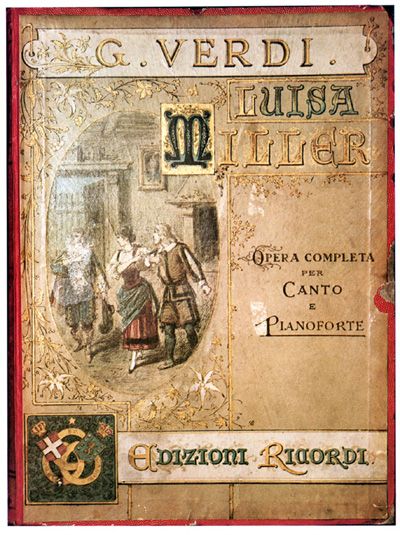
There perhaps are other a cappella (unaccompanied) ensemble passages in opera,
but none are more famous than the Act 2 quartet of Verdi's "Luisa Miller." Why
did he decide to write a passage without orchestra? A whim? No one seems quite
sure, not even scholars. But the result is arresting, and it is a much loved
moment in opera. It is also reputed to be quite difficult to pull off.
Synopsis:
"Luisa Miller" tells the story of sweet, vulnerable Luisa, who loves Rodolfo,
the son of a ruthless nobleman whom Luisa’s own father loathes. The young
couple’s relationship leads to---can you guess?---catastrophe.
NOTE:
I can't, for the life of me, find any goddamned thing on the Internet that
explains what is exactly happening here. Whatever the hell is happening, is
happening in these events:
Scene 2: A room in Count Walter's castle: At the castle Walter and Wurm recall
how the Count rose to power by killing his own cousin and Wurm reminds the Count
how Rodolfo also knows of this. The two men realize that, unless they act
together, they may be doomed (Duet: L'alto retaggio non ho bramato / "The noble
inheritance of my cousin"). Duchess Federica and Luisa enter. The girl confirms
the contents of her letter. Scene 3: Rodolfo's rooms: Rodolfo reads Luisa's
letter and, ordering a servant to summon Wurm, he laments the happy times which
he spent with Luisa (Quando le sere al placido / "When at eventide, in the
tranquil glimmer of a starry sky"). The young man has challenged Wurm to a duel.
To avoid the confrontation the courtier fires his pistol in the air, bringing
the Count and his servants running in. Count Walter advises Rodolfo to revenge
the offense he has suffered by marrying Duchess Federica. In despair, Rodolfo
abandons himself to fate (L'ara o l'avello apprestami / "Prepare the altar or
the grave for me").
https://www.youtube.com/watch?v=KCB2qZvT3Xg
About the opera:
https://eno.org/discover-opera/operas/an-introduction-to-luisa-miller/
FINAL BOW:
Our All Beauty All The Time Edition ends where it began, with a tribute to the
under-appreciated, humble, late tenor, Giuseppe Giacomini, who passed away at 80
a few days ago in his native Italy. A humble tenor! Will wonders never cease? As
the opera world says goodbye to this modest fellow, known to friends as "Bepi,"
here he is with the soaring, heart-rending aria from Puccini's "Madama
Butterfly," "Addio, Fiorito Asil," or "Goodbye, Flowery Isle." A sort of
symbolic goodbye from Giacomini to the flowery isle that is, or was, Earth. Turn
it up.
https://www.youtube.com/watch?v=tcpCTNIkhjU
Setting: Butterfly's house
Synopsis: Pinkerton comes to Butterfly's house and, after speaking to Suzuki,
decides that it would be too painful to say goodbye to Butterfly directly. He
bids adieu to the house in which he and Butterfly spent many happy hours.
Translation:
http://operainenglish.blogspot.com/2013/08/addio-fiorito-asil-madama-butterfly.html
Saturdee Opry Links ENCORE!
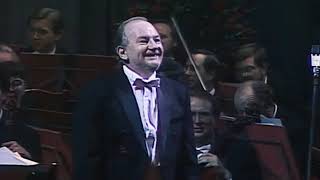
The late Giuseppe Giacomini sings the praises of the sun, and the sun that
radiates from the face of a loved one.
https://www.youtube.com/watch?v=uTse_XJX32g
About the music, translation:
https://en.wikipedia.org/wiki/%27O_sole_mio
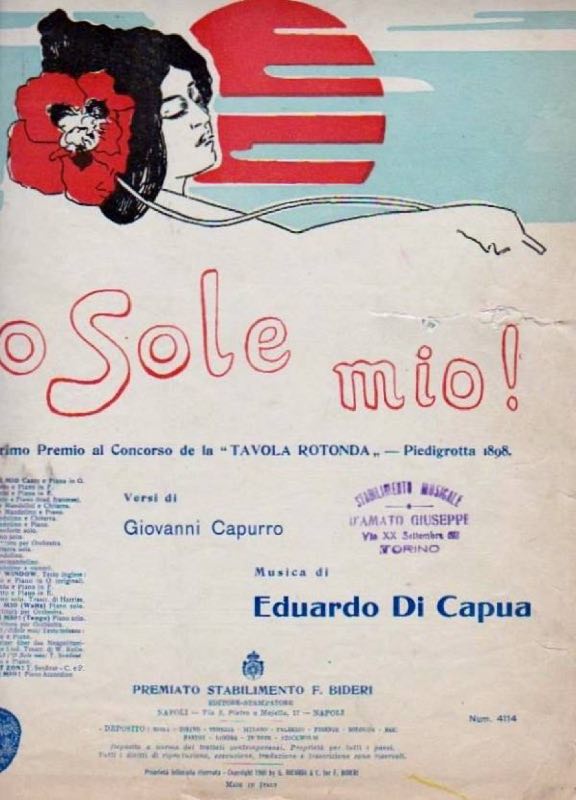
Back to Opera Links
Back to Home Page
|



